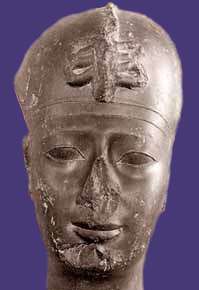Ezekiel 29
| Ezekiel 29 | |
|---|---|
|
Book of Ezekiel 30:13–18 in an English manuscript from early 13th century, MS. Bodl. Or. 62, fol. 59a. A Latin translation appears in the margins with further interlineations above the Hebrew. | |
| Book | Book of Ezekiel |
| Bible part | Old Testament |
| Order in the Bible part | 26 |
| Category | Nevi'im |
Ezekiel 29 is the twenty-ninth chapter of the Book of Ezekiel in the Hebrew Bible or the Old Testament of the Christian Bible. This book contains the prophecies spoken by the prophet Ezekiel, and is one of the Books of the Prophets.[1]
Text
- The original text is written in Hebrew language.
- This chapter is divided into 21 verses.
Textual versions

The head of "Apries" or "Pharaoh-Hophra", Louvre
Some most ancient manuscripts containing this chapter in Hebrew language:
- Masoretic Text
- Codex Cairensis (895 CE)
- Aleppo Codex (10th century)
- Leningrad Codex (1008-1009)
Ancient translations in Koine Greek:
- Septuagint
- Theodotion version (~AD 180)
Structure
NKJV groups this chapter into:
- Ezekiel 29:1-16 = Proclamation Against Egypt
- Ezekiel 29:17-21 = Babylonia Will Plunder Egypt
Verse 2
- "Son of man, set your face against Pharaoh king of Egypt, and prophesy against him, and against all Egypt." (NKJV)[2]
- "Son of man" (Hebrew: בן־אדם ḇen-’ā-ḏām): this phrase is used 93 times to address Ezekiel.[3]
- "Pharaoh" (Hebrew: פרעה par-‘ōh; Egyptian: pr-±o, "great house"; Greek: Φαραω, Pharao): the title of ancient Egyptian kings, of royal court, and (in new kingdom) of the king, until the Persian invasion.[4][5] The title at the time of the prophecy ("January 7, 587 BCE"[6]) refers to Hophra (c. 589-570 BC) as noted in Jeremiah 44:30 (Ουαφρη[ς] in the Greek Old Testament),[7] written as Apries (Ancient Greek: Ἁπρίης) by Herodotus (ii. 161) and Diodorus (i. 68), Waphres by Manetho, who correctly records that he reigned for 19 years, the fourth king (counting from Psamtik I) of the Twenty-sixth dynasty of Egypt.[8]
See also
- Related Bible parts: Isaiah 30, Jeremiah 44, Ezekiel 17
Notes and references
- ↑ Therodore Hiebert, et.al. 1996. The New Interpreter's Bible: Volume: VI. Nashville: Abingdon.
- ↑ Ezekiel 29:2
- ↑ Bromiley 1995, p. 574.
- ↑ Brown, 1994 & "פַּרְעֹה".
- ↑ Gesenius, 1979 & "פַּרְעֹה".
- ↑ The New Oxford Annotated Bible with the Apocrypha, Augmented Third Edition, New Revised Standard Version, Indexed. Michael D. Coogan, Marc Brettler, Carol A. Newsom, Editors. Publisher: Oxford University Press, USA; 2007. pp. 1221-1222 Hebrew Bible. ISBN 978-0195288810
- ↑ Cf. Christoffer Theis, Sollte Re sich schämen? Eine subliminale Bedeutung von עפרח in Jeremia 44,30, in: UF 42 (2011), S. 677–691 for the writing of this particular name.
- ↑
 Chisholm, Hugh, ed. (1911). "Apries". Encyclopædia Britannica (11th ed.). Cambridge University Press.
Chisholm, Hugh, ed. (1911). "Apries". Encyclopædia Britannica (11th ed.). Cambridge University Press.
Bibliography
- Bromiley, Geoffrey W. (1995). International Standard Bible Encyclopedia: vol. iv, Q-Z. Eerdmans.
- Brown, Francis; Briggs, Charles A.; Driver, S. R. (1994). The Brown-Driver-Briggs Hebrew and English Lexicon (reprint ed.). Hendrickson Publishers. ISBN 978-1565632066.
- Clements, Ronald E (1996). Ezekiel. Westminster John Knox Press. ISBN 9780664252724.
- Gesenius, H. W. F. (1979). Gesenius' Hebrew and Chaldee Lexicon to the Old Testament Scriptures: Numerically Coded to Strong's Exhaustive Concordance, with an English Index. Translated by Tregelles, Samuel Prideaux (7th ed.). Baker Book House.
- Joyce, Paul M. (2009). Ezekiel: A Commentary. Continuum. ISBN 9780567483614.
External links
Jewish
Christian
This article is issued from
Wikipedia.
The text is licensed under Creative Commons - Attribution - Sharealike.
Additional terms may apply for the media files.
